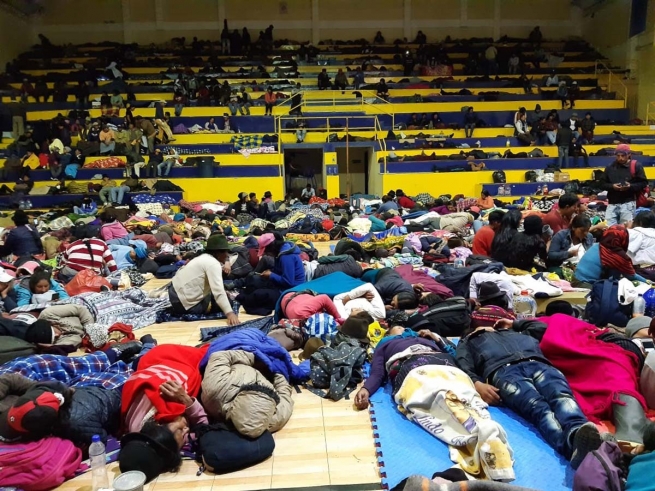ECUADOR: The Salesian Polytechnic University campus in Quito opens its doors to more than 3,000 indigenous people protesting at the country’s capital

(MissionNewswire) The Salesian Polytechnic University campus in Quito, Ecuador, has opened its doors to welcome and assist more than 3,000 indigenous people from all over the country. The economic and social crisis that has intensified in Ecuador in recent weeks has triggered a wave of protests and repression by government forces. Thousands of indigenous people have come to the country’s capital, Quito, to defend the rights of those most in need.
Money from the International Monetary Fund that was provided to alleviate the severe economic crisis in exchange for harsh economic measures by the government has turned the country into a powder keg. The population has taken to the streets to demonstrate against these measures that damage the most vulnerable.
The transport strike, which paralyzed the country, and the mobilization of more than 40,000 people from the various indigenous communities of Ecuador have put the government on the rails, which has moved the country’s capital to Guayaquil and decreed a curfew in various areas to try to curb citizens’ mobilizations.
Salesian missionaries, who have been living and working in Ecuador since 1888, have long distinguished themselves by the care and support they show to the indigenous communities, fostering efforts to preserve their culture and their traditions. Missionaries have opened the doors of the Salesian Polytechnic University to accommodate people in its gardens and gym so they can have a place to rest.
“Solidarity initiatives have been organized to obtain mattresses and blankets, take turns in the makeshift infirmary for the occasion and to cook food for them,” said one of the members of the educational community.
These people arrive at the Salesian center already tired from their long marches, and many of them are also injured by tear gas, which the police have used in response to their protests. Initially the gymnasium of at the university was utilized for the protesters, but the massive arrival of people in recent days has made it necessary to furnish the courtyards, the gardens and any place available to offer rest and shelter to those who want to peacefully claim their own rights and defend their country.
“The Salesians have opened their doors from the heart, as they have also done on previous occasions of conflict, in favor of the indigenous communities of the Amazon, the Sierra and the Afro-Ecuadorians, as one big family. We do not want there to be bloodshed, let alone deaths, but that peace and social justice are imposed as arguments against purely economic interests,” said one of the young people helping as a volunteer.
The Salesian Polytechnic University is the largest of all Salesian universities with more than 24,500 students. In 2019, for the first time, the university ranked within the top 100 universities in Latin America competing with 4,000 in the region. Across its three campuses, the university offers 27 degree programs and 10 doctorate programs, 62 research groups, 10 educational innovation groups and 98 Salesian Association of Universities groups.
Salesian missionaries in Ecuador focus on providing education, social programming and workforce development to help the country’s most vulnerable citizens. Technical and vocational education is also provided to help youth gain the skills needed to find and retain long-term stable employment.
Ecuador’s poverty rate was 36.7 percent in 2007 and dropped to 22.9 percent in 2016. These results show that 1.4 million Ecuadorians escaped poverty within nine years. However, many Ecuadorians still live in impoverished conditions. Ecuador is one of the most inequitable societies in the world, according to UNICEF. The richest 20 percent of the population receives almost 50 percent of the national income, while the poorest 20 percent receives only 5 percent. According to the World Food Program, almost 26 percent of all children under age 5 have stunted growth, increasing to 31 percent in rural areas and 47 percent in indigenous communities.
Close to 20 percent of Ecuador’s population is people of indigenous heritage. For poor, rural and indigenous youth, education provides the best opportunity for finding employment, reducing inequities and breaking the cycle of poverty. Salesian missionaries have been providing education and other social programs for disadvantaged youth across Ecuador for more than 125 years.
###
Sources:
ANS Photo (usage permissions and guidelines must be requested from ANS)
Salesian Missions – Ecuador
Salesian Polytechnic University Ecuador
UNICEF – Ecuador





